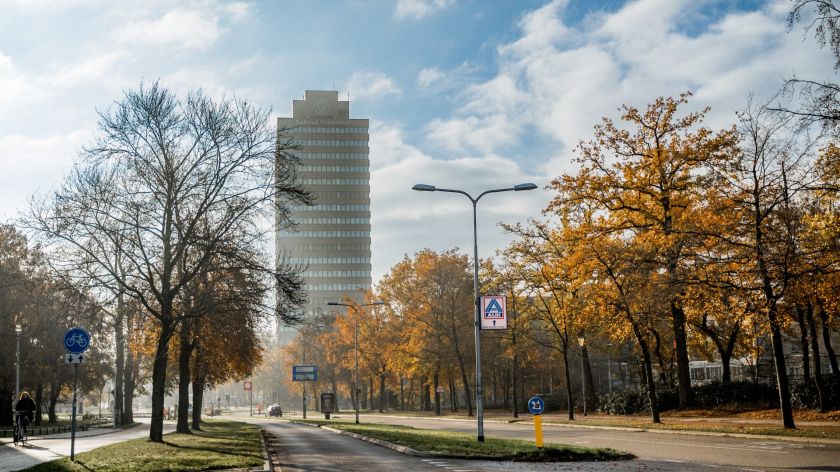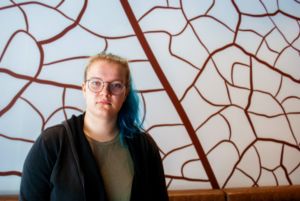German psychology students on figuring out careers after law change: ‘In the beginning, it was devastating’
-
 Foto: Johannes Fiebig
Foto: Johannes Fiebig
Due to a new law, German psychology students at Radboud University might not be able to return to their home country to become psychotherapists anymore. Vox is following three psychology students at Radboud as they navigate the law changes that will likely determine their future careers. ‘I’m sure there is a way somewhere. But where?’
What happens when a law change derails your future career plans? Over the past year, psychology students Ann-Kathrin Claßen, Natascha Köcher, and Carina Meyer have found out firsthand. When the three German students started their degrees at Radboud University in 2020 (Claßen and Meyer) and 2021 (Köcher), they planned to return to their home country to become psychotherapists after their bachelor’s. But a new psychotherapist law in Germany seems to render this impossible: the bachelor programme at Radboud will likely not meet the requirements to follow a psychotherapy master in Germany anymore.
When we last talked to the three students at the end of 2022, Claßen and Meyer had just been rejected for a transfer to a German psychology bachelor, but were still hoping to be accepted into a German psychotherapy master. Now, both students are a few weeks away from graduation and are considering different career paths. For Köcher, who will start her third year this summer, some hope remains – but different challenges have already started to pop up.
Alternatives
‘I was in contact with some German universities earlier this year,’ says Ann-Kathrin Claßen. The psychology student will graduate with her bachelor’s degree from Radboud this summer and in our interview last December, she had some hope left to be admitted into a German psychotherapy master with her degree. And now? ‘I haven’t received a definitive answer from the German universities yet, but I think the chances are quite slim that I am going to get in.’
A few months ago, Claßen was still considering taking a gap year to take Dutch courses and apply for internships in the mental healthcare field to better her chances of becoming a therapist – in Germany or abroad. Now, the 21-year-old’s plans have changed: ‘I did look into other masters that could interest me,’ she says. If psychotherapy in German won’t be possible with her bachelor’s, she will likely opt for a master’s in Work & Organisational Psychology at Radboud next year. ‘I do look forward to the other master as well,’ she says. ‘But I would have preferred to do a clinical master.’
‘There are always alternatives, even if the initial plan didn’t work out’
‘I think the problem is that the communication between the lawmakers abroad and the university wasn’t good,’ she says. ‘But I don’t want to point fingers. I don’t think it’s Radboud’s fault that we are in this situation.’ She still hopes that the other affected study cohort – the students now in their second year at Radboud – continues to advocate for their cause. Even if it’s uncertain that this will lead to anything. ‘Don’t hang your head,’ she says. ‘There are always alternatives, even if the initial plan didn’t work out.’
Not all bad
Like Claßen, Carina Meyer still has no indication of what her future will bring. She, too, has received no definitive news about the possibility to get into the psychotherapy master in Germany. For now, there is no other option than to wait and hope for the best. For Meyer, that also means coming to terms with the possibility that she might not become a psychotherapist: ‘In the beginning, it was devastating, and I felt like my dreams and hopes were being crushed out of nowhere,’ she says when we meet her for our interview. ‘Now, I am accepting it and trying to be more rational about it.’
Instead of only considering the option of becoming a psychotherapist in Germany, Meyer is now also looking into other career paths. Earlier this study year, she attended the Master’s Open Day at Radboud. ‘Before going there, I thought I wouldn’t like any of them as I always wanted to become a psychotherapist, but surprisingly I found two that I really enjoyed. I am definitely more optimistic about my future, even though it might not be the future I imagined when I started my degree.’
‘I am definitely more optimistic about my future’
While Meyer still hopes to get into the psychotherapy master’s in Germany and follow her dream, she also worries about the changes this might entail: ‘I am quite nervous about moving to another city. You need to start over somewhere else and meet new people.’ In fact, staying at Radboud might be a good option for Meyer: ‘Many of my friends will do their masters at Radboud, so that gives me quite a lot of comfort.’
New problems
Unlike Claßen and Meyer, Natascha Köcher still has a year left until graduation – and, at the moment, settling on a different master is not an option for her. At the end of last year, the second-year student and her friends had just set up a petition to raise awareness of the psychotherapy master issue. ‘We got quite some signatures,’ she says. ‘I think there were more than 250 in the end.’ And, she says, the petition did raise awareness: ‘I was approached by some people who did not know how seemingly hopeless the situation really is and who asked for the legal texts I found.’
But figuring out the future of her career feels lonely, the student says. ‘I still have to solve the issue on my own. I still have to look for possible internships on my own. And, if I do find something interesting, I do catch myself thinking that I shouldn’t share it with anyone, because they might apply to the same internship.’ That train of thought, she says, is something she really doesn’t like: ‘It sounds very egoistical to think like this – and it is. It’s a huge internal conflict.’
‘I still have to solve the issue on my own’
Additionally, because the psychotherapy master’s degree in Germany is still new, the places are sparse – and the average you need to get in is high. As of now, Köcher’s grades are not high enough to meet the requirement: ‘I feel like the big issue might be solvable now, just to learn that I won’t make it because of something else.’ Maybe there is some detour that will lead down the therapist path: ‘I’m sure there is a way somewhere,’ she says. ‘But where?’





